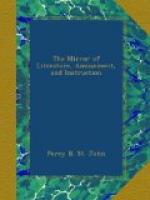* * * * *
NOTES FROM THE QUARTERLY REVIEW—(JUST PUBLISHED.)
An old acquaintance of ours, as remarkable for the grotesque queerness of his physiognomy, as for the kindness and gentleness of his disposition, was asked by a friend, where he had been? He replied, he had been seeing the lion, which was at that time an object of curiosity—(we are not sure whether it was Nero or Cato.) “And what,” rejoined the querist, “did the lion think of you?” The jest passed as a good one; and yet under it lies something that is serious and true.
* * * * *
The possibility of a great change being introduced by very slight beginnings may be illustrated by the tale which Lockman tells of a vizier who, having offended his master, was condemned to perpetual captivity in a lofty tower. At night his wife came to weep below his window. “Cease your grief,” said the sage; “go home for the present, and return hither when you have procured a live black-beetle, together with a little ghee, (or buffalo’s butter.) three clews, one of the finest silk, another of stout packthread, and another of whip-cord; finally, a stout coil of rope.”— When she again came to the foot of the tower, provided according to her husband’s commands, he directed her to touch the head of the insect with a little of the ghee, to tie one end of the silk thread around him, and to place the reptile on the wall of the tower. Seduced by the smell of the butter, which he conceived to be in store somewhere above him, the beetle continued to ascend till he reached the top, and thus put the vizier in possession of the end of the silk thread, who drew up the packthread by means of the silk, the small cord by means of the packthread, and, by means of the cord, a stout rope capable of sustaining his own weight,—and so at last escaped from the place of his duresse.
* * * * *
ANOTHER UNIVERSITY.
A munificent lady in Yorkshire has recently offered to subscribe 50,000_l_. towards the endowment of an university in that county, and a noble earl has professed his willingness to give a similar benefaction. These princely examples will no doubt be followed ere long, and the scheme completed—though we have some doubts whether the site of the new university for the north would be best selected in Yorkshire.
* * * * *
Greater changes have taken place in no single age than are at this time in progress; and the revolutions in which empires, kingdoms, or republics are made and unmade, and political constitutions rise and burst like bubbles upon a standing pool, when its stagnant waters are disturbed by a thunder-shower, are not the most momentous of those changes, neither are they those which most nearly concern us. The effects of the discovery of printing could never be felt in




